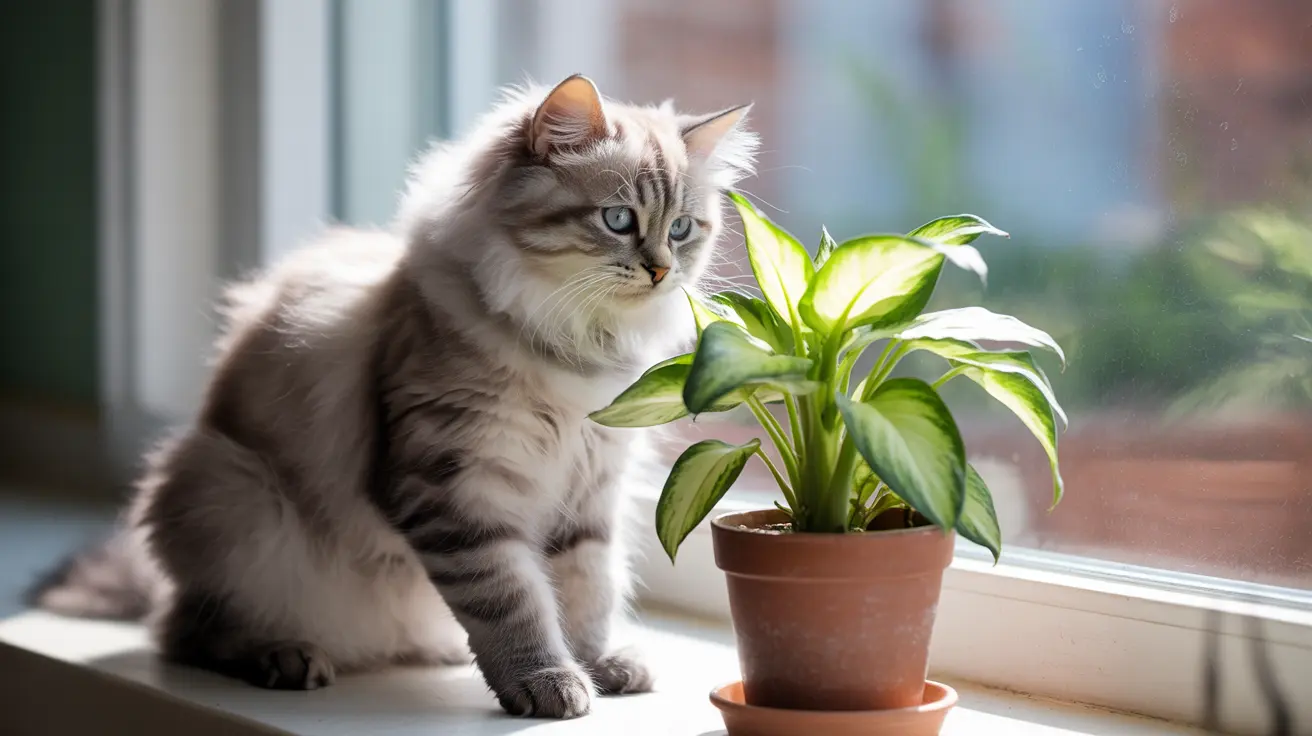Understanding Dieffenbachia and Its Risks to Cats
Dieffenbachia, commonly known as dumb cane, is a popular houseplant that can pose serious health risks to cats. While its striking variegated leaves make it an attractive indoor decoration, cat owners need to be aware of its toxic properties and take appropriate precautions to keep their feline friends safe.
This comprehensive guide will explore why dieffenbachia is dangerous to cats, how to recognize signs of poisoning, and what steps to take if your cat encounters this toxic plant.
What Makes Dieffenbachia Toxic to Cats?
Dieffenbachia contains insoluble calcium oxalate crystals, known as raphides, which are the primary source of its toxicity. When a cat bites or chews any part of the plant, these microscopic crystals are released, causing immediate injury to the mouth and digestive tract.
The plant's sap also contains additional inflammatory compounds that worsen the tissue damage and increase pain. Even drinking water that has been in contact with cut stems or leaves can be harmful to cats.
Recognizing Signs of Dieffenbachia Poisoning
If your cat has been exposed to dieffenbachia, you may notice several symptoms developing rapidly:
- Intense drooling or foaming at the mouth
- Pawing at the face and mouth
- Swelling of the tongue, lips, and throat
- Difficulty swallowing or breathing
- Vomiting and gagging
- Loss of appetite
- Oral pain and irritation
In severe cases, the swelling can become life-threatening if it affects the airways. This is why immediate action is crucial if you suspect your cat has encountered the plant.
Emergency Response and Treatment
If you believe your cat has ingested or been exposed to dieffenbachia, take these immediate steps:
- Remove any visible plant material from your cat's mouth and fur
- Gently rinse their mouth with milk to help dissolve the crystals
- Contact your veterinarian or pet poison hotline immediately
- Monitor your cat's breathing and overall condition
- Keep the plant or a sample for identification purposes
Do not attempt to induce vomiting, as this can cause additional damage to the throat and mouth.
Prevention and Creating a Safe Environment
The best way to protect your cat from dieffenbachia poisoning is through prevention:
- Remove all dieffenbachia plants from your home
- Choose pet-safe alternatives like spider plants or Boston ferns
- Keep any potentially toxic plants in completely inaccessible areas
- Research all new plants before bringing them into your home
- Consider creating a dedicated "cat garden" with safe plants
Frequently Asked Questions
What are the signs that my cat has ingested Dieffenbachia and is experiencing toxicity?
The primary signs include excessive drooling, oral swelling, pawing at the mouth, difficulty swallowing, vomiting, and visible distress. These symptoms typically appear within minutes of exposure.
How does Dieffenbachia cause harm to cats and what makes it toxic?
Dieffenbachia contains calcium oxalate crystals that pierce and irritate the mouth and digestive tract tissues. These crystals, combined with inflammatory compounds in the plant's sap, cause immediate pain and swelling.
What immediate first aid steps should I take if my cat chews on a Dieffenbachia plant?
Remove any plant material from your cat's mouth, rinse with milk if possible, and contact your veterinarian immediately. Don't induce vomiting, as this can cause additional damage.
When should I seek emergency veterinary care for Dieffenbachia poisoning in my cat?
Seek immediate emergency care if you notice difficulty breathing, severe swelling, excessive drooling, or signs of extreme distress. Any suspected exposure should be evaluated by a veterinarian.
What are safe alternative houseplants I can keep if I have cats at home?
Safe alternatives include spider plants, Boston ferns, parlor palms, and areca palms. Always verify a plant's safety through reliable sources before bringing it into your home with cats.
Conclusion
While dieffenbachia is toxic to cats, understanding the risks and taking appropriate precautions can help keep your feline companion safe. If you currently have this plant in your home, consider removing it or ensuring it's completely inaccessible to your pets. When in doubt about any plant's safety, consult with your veterinarian or choose from known pet-safe alternatives.






